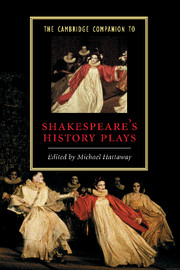Book contents
- Frontmatter
- PART 1 CONTEXTS
- PART 2 THE PLAYS
- 6 Plantagenets, Lancastrians, Yorkists, and Tudors: 1–3 Henry VI, Richard III, Edward III
- 7 Historical legacy and fiction: The poetical reinvention of King Richard III
- 8 King John: changing perspectives
- 9 Richard II: Shakespeare and the languages of the stage
- 10 Henry IV, Parts 1 and 2
- 11 Henry V: ‘the quick forge and working house of thought’
- 12 Shakespeare's ancient Rome: difference and identity
- 13 Shakespeare's other historical plays
- 14 Theatrical afterlives
- PART 3 REFERENCE MATERIAL
8 - King John: changing perspectives
from PART 2 - THE PLAYS
Published online by Cambridge University Press: 28 May 2006
- Frontmatter
- PART 1 CONTEXTS
- PART 2 THE PLAYS
- 6 Plantagenets, Lancastrians, Yorkists, and Tudors: 1–3 Henry VI, Richard III, Edward III
- 7 Historical legacy and fiction: The poetical reinvention of King Richard III
- 8 King John: changing perspectives
- 9 Richard II: Shakespeare and the languages of the stage
- 10 Henry IV, Parts 1 and 2
- 11 Henry V: ‘the quick forge and working house of thought’
- 12 Shakespeare's ancient Rome: difference and identity
- 13 Shakespeare's other historical plays
- 14 Theatrical afterlives
- PART 3 REFERENCE MATERIAL
Summary
King John is a provocatively problematic play. In terms of its provenance alone, there have been keenly debated exchanges about its genealogical relationship to its main source, with editors of scholarly editions arguing on either side for Shakespeare's play as a source for the anonymous The Troublesome Reign of John King of England and for the latter as a source for the former. While the majority prefer to see Troublesome Reign as the source, and the most recent accounts of this have been quite dismissive of the opposite camp, the debate in its entirety has led to useful close readings of the anonymous play. Discussion concerning other known sources (Holinshed, Foxe, Hall) and an analogue, Radulph of Coggeshall's English Chronicle (written in Latin), has been somewhat less heated, and there are far fewer arguments for a direct use of its other dramatic analogue, Bale's King Johan. But there are resonances, if not replications, between Bale's and Shakespeare's plays that, if properly investigated, might reinforce some of the more recent scholarly excursions on Shakespeare's behalf, and there is a strong temptation to imagine, if not actually believe, that Shakespeare 'worked with the old play in his head, if not in his hand'.
With Nathan Drake, ‘we are well aware, that, to many of our readers, the chronological discussion incident to a new arrangement, will be lamented as tedious and uninteresting; the more so, as nothing absolutely certain can be expected as the result’.
- Type
- Chapter
- Information
- The Cambridge Companion to Shakespeare's History Plays , pp. 126 - 140Publisher: Cambridge University PressPrint publication year: 2002
- 1
- Cited by



